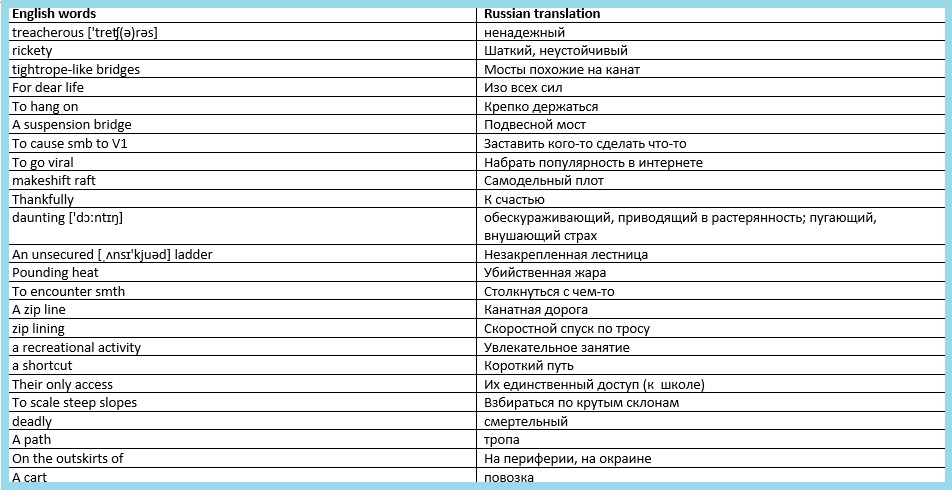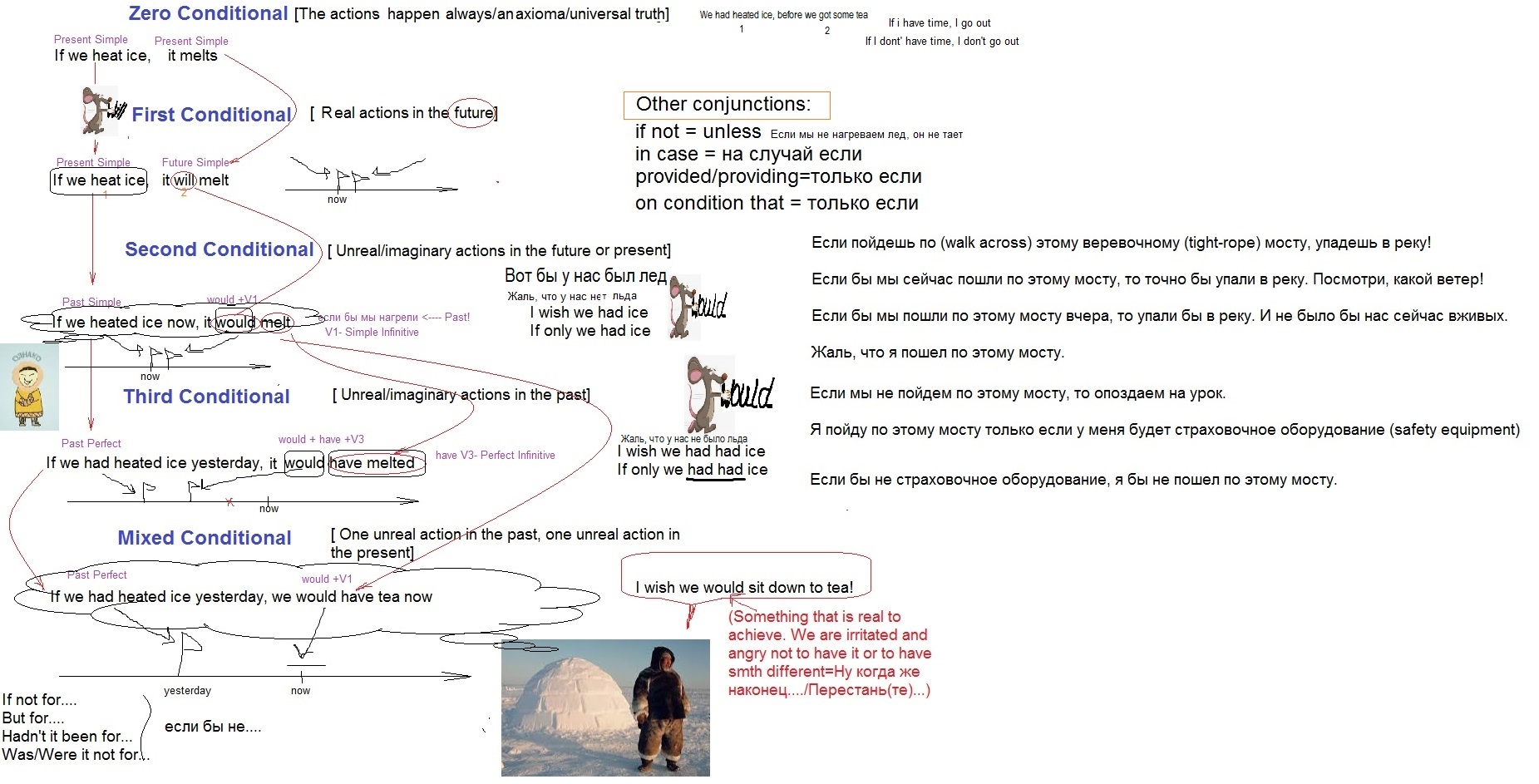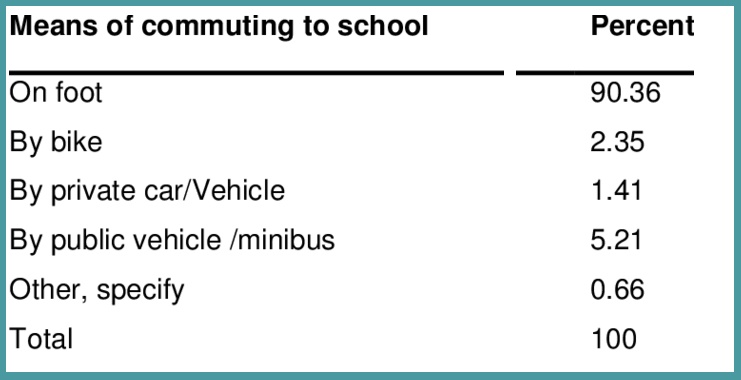Attention! For the club do tasks I-VIII or, at least, watch the video in task II. Find out more about our Grammar-and-Speaking Clubs in our VK Community from the video below
I. Before watching the video below, study these words.

II. Watch the video and read the text, mark the stress [отметь ударение] in all difficult words. Make pauses and repeat after the speaker, copying her intonation and pronunciation. Translate all.
Print out this page [распечатай эту страницу] and label new words with Russian translations =Распечатай эту страницу и подпиши новые слова из русским переводом. 
If it is hard for you, try to translate #1- 4
III. Write as many synonyms for the word “journey to school” as possible.
a journey to school =
IV. Watch again and do the test ↓
V. Learn the active words using the test
Va Read and translate the script of the video |
After reading and translating the script of the video, do this exercise below. For better understanding review the picture-scheme of Condtionals below | |||||||||||||||||||||||||||||||||
|
Hopping on the bus in the morning may seem like a struggle to the average student, but can you imagine if you had to hike for five hours along a treacherous mountainside or cross a rickety unmaintained suspension bridge. Here are some school children's treks to school that will get your heart racing. 1. Balance! Indonesian children need to be built tough in order to obtain their education. It seems near Padang children resemble circus performers as they cross tightrope-like bridges 30 feet above the river. 2. Suspended In order for these Indonesian children to get to their school near Lebak, they must cross a suspension bridge. This wouldn't be so bad if the bridge wasn't damaged causing them to have to climb along one side, hanging on for dear life. Thankfully once photos of the bridge went viral, a new bridge was constructed. 3. Snow-ward bound In order to reach a boarding school in the mountains of Zanskar in the Indian Himalayas, children must trek through snow and ice to reach their dwelling. Thankfully this isn't a daily thing for them, as a slip through the ice could be deadly. 4. Paddle down the river Crossing the Ciherang River on a makeshift raft is a normal commute for students of Cilangkap, Indonesia. If families cannot afford a boat, children need to make their own. 5 Shoots and ladders In Zhang Jiawan village in Southern China, schoolchildren need to make a daunting journey to the mountains. They don't need to hike though; they need to climb. A series of unsecured wooden ladders cover the entire mountainside. 6. Beat the heat Children in rural South Africa must walk four miles to get to their school. They must leave early in the morning to escape the pounding heat and there is no telling what kinds of wild creatures they could also encounter along the way. 7. Horse-drawn cart For students in Delhi India a horse-drawn cart is their lift to school. It can get a little crowded though. More than 35 children use these to get to class on the outskirts of New Delhi. 8. Zipping through the trees While we may enjoy zip lining as a recreational activity, it's become a necessity for these children. In order to reach their school, children in Colombia cross the Rio Negro river daily. As a shortcut, some children living in southeast of the capital Bogota these wires are their only access. 1,300 feet above the river they can reach speeds up to 40 miles per hour to reach the opposite shore - half a mile away! 9. Along a mountain path in Gulu, China, it could take five hours walking along a 1- foot- wide path for children to get to school. The primary school is located halfway up the mountain and is considered one of the most remote schools in the world. 10. Downriver In Vietnam village children need to walk more than 3 kilometers from their homes to their school. They must cross a river and scale steep slopes on a good day. During the rainy season the river swells and becomes much more dangerous. That's our video, guys. Thanks for watching. So, how was your trip to school when you were a kid? Was it deadly? Let us know in the comments, and while you're here, check out these other videos. Also please don't forget to click like and subscribe. |
Match the beginnings of the sentences on the left with the endings on the right:
|
VI. Now write answers to the questions and send to me for a check. Use a dictionary to help you (https://multitran.ru):
1. What may happen during each journey? Use Participles I =Используй причастие I (переводиться на русский как «делая что-то»)
For example: When crossing [пересекая] a tightrope-like bridge children may fall down into the river and drown [утонуть] in it.
2. Which of the trips seems the most dangerous to you? Why?
3. Why do these children have to risk their lives getting to school?
4. What should be done to make their commutes to school less dangerous? (prompts: - to fund= to finance = финансировать, to llocate money выделить деньги)
5. What is a modern alternative to such commutes?
6.Would these children benefit from online schooling?
7. How would they benefit from distant studying? And what would they lose?
8. How do you get to school/work?
9. What would you change about your daily commutes?Why?
10. About each of the ways to school write what will /may happen if something goes wrong (figure out what can go wrong, use the previous exercise). For better grammar, use the scheme of conditionals below. Try to use "unless".
Picture-scheme of Condtionals

VII. Learn by heart stories about three journeys that struck you most and be ready to tell me about them
VIII. Watch the video below and answer the question: What will happen if the school bus breaks?
IX. Read the text below and say how it is related with the videos above, grounding your ideas.
(Do the expressions contradict each other? complement each other? highlight totally different themes?)
Source: https://www.greatschools.org/gk/articles/virtual-schools/
What supporters say
- Virtual schools offer a quick fix. Virtual schools can instantly expand a school district’s course offerings to include AP classes, languages, and extracurricular courses.
- They solve student challenges. Students with scheduling, social, or academic challenges do not have to find a parent to homeschool them or a tutor to teach them.
- They offer custom learning. Students can learn at their own pace, so struggling to keep a gifted student engaged or a struggling one up to speed is solved.
What critics say
- It’s easy to fall behind. Though there are usually online tools for parents to keep tabs on how students are doing, kids won’t get the same in-class triggers that they are slipping behind.
- They are part of a movement to privatize public schools. Since many public virtual schools are either operated by (or use curriculum from) private curriculum companies, there has been concern that this model takes money from public schools to enrich private companies.
- Where’s the social life? For kids who want to be engaged in sports, meetings, clubs, and the social world of school, virtual schooling may be isolating. Socializing happens but it’s often virtual or outside of school.
- There’s not enough supervision. For some kids, virtual schooling may amount to too much freedom. For the student more interested in advanced partying than advanced placement classes, virtual schooling may provide the perfect recipe for failure.
- It’s not the optimal model. Critics point out that research suggests that the most effective online schooling takes place in a “blended” learning environment — where kids experience a mix of online classes as wells as face-to-face interactions with teachers and students. These schools are known as hybrid schools.
- Virtual schools are untested. Though there are thousands of kids who have graduated from virtual high schools, many experts have noted that there’s no solid evidence that virtual schools are providing a comparable education to traditional school. Data is not as comparable between traditional and virtual schools in part because there is higher mobility in the latter. However, a recent study of public charter schools in California found that nearly an eighth of virtual school students tested in 2010-2011 attended a school in the bottom ten percent overall statewide.
X. [EGE, IELTS] Write the following essay.
|
Imagine that you are doing a project on commuting to school.You have collected some data on the subject (see the chart on the right). Comment on the data in the chart and give your personal opinion on the subject of the project.Write 200–250 words. Use: a brick-and-mortar school= an off-line school, conventional, a thing of the past =пережиток прошлого |
 |
[TOEFL, IELTS, FCE/CAE] Write the following essay. Write at least 250 words
Do you agree or disagree with the following statement: Overall, distant learning is more efficient for high school students.
Some advice on how to write essays for international exams is at https://webenglish.org/index/0-16
XI. Make the following dialogue using some of the prompts below it
The student is late for school. He / She has missed the first 3 classes. The teacher is cross (сердит). The student explains why he/she is late. Something happened on the way to school. The student lives in a distant village. There is no adequate transport to school.
Prompts:
- You see, … =Видите ли, … /Дело в том, что….
- To get into trouble on the way to school= to get into a mess…=попасть в беду по дороге в школу
- To collapse=обрушиться
- To stumble =споткнуться
- To fall (fell-fallen)off the mountain
- To plunge into a river =упасть в реку
- To get torn=оборваться
- To break- broke-broken
- To slip(ped)=подскользнуться
- To wait for rescuers=ждать спасателей
- Had to V1 =вынужден был…
- To scramble over rocks =карабкаться по скалам
- to risk Ving =рисковать чем-то
- Almost/nearly drowned=чуть не утонул
- Hardly had I +V3, when + Past Simple =Не успел я (что-то сделать), как (что-то произошло)
- You should (not) have V3 = Тебе(не)следовало (что-отделать)
- I wish they would V1 =Когда же они наконец уже (что-то сделают, на пример, построят мост)